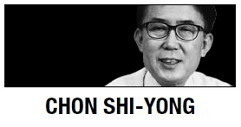Former President Kim Young-sam was laid to rest at National Cemetery in Seoul on Thursday after a state funeral that grabbed the eyes and hearts of many Koreans who remember the indelible mark he left in Korean politics and history.

As a citizen who went through the 1970s and 1980s in which Kim was a gigantic pro-democracy fighter and as a journalist who covered him when he was president in the 1990s, I experienced a lot of emotions watching the funeral on television.
Then I recalled another state funeral held six years ago, for former President Kim Dae-jung, whose life was, in some respects, strikingly similar to that of Kim Young-sam.
The two Kims, called “YS” and “DJ” after the initials of their given names, were inseparable from the nation’s arduous struggle to achieve democracy, and both eventually realized their dream of assuming the highest elected office in the country.
There were times they joined forces against the successive military dictatorships, but in general, they were rivals — to the degree that they and their aides did not conceal their hatred for each other — until the later years of their life.
YS summed up their relationship succinctly when he paid a visit to DJ at his hospital bedside in 2009: “Ours is a long-held relationship of both competition and cooperation. This special relationship may be unprecedented in the world.”
Men of faith
As a Blue House correspondent, I covered DJ as president as well, a privilege rarely given to Korean journalists who usually are assigned to one particular political party or a major faction. It was a challenging job, yet I was fortunate to have had such a privilege.
As I saw, both YS and DJ were men of faith and strength. Most of all, they believed in the value of democracy, for which they risked their lives. YS survived an acetic acid attack during the rule of President Park Chung-hee, held a hunger strike for 23 days and underwent house arrest during the Chun Doo-hwan government.
DJ suffered harsher, more dangerous oppressions: He could have been dumped into the sea after being kidnapped in Tokyo by Park’s intelligence agents, he received a death sentence from the Chun regime and was incarcerated. As we know now, both never gave in.
YS, in my view, was more straightforward and audacious — to the degree that some detractors called him a self-assertive, brash man lacking political adroitness. Had he not been so daring, however, he could not have endured the brutal suppression of the pro-democracy movement.
Nor would he have been able to undertake the “blitzkrieg” reforms, like putting former presidents Chun and Roh Tae-woo on trial, the purge of a private organization of senior military officers and generals, a ban on false and borrowed names and the demolition of the former Japanese Governor-General’s Office building.
In contrast, DJ was a thoughtful, meticulous man. This should not mean, however, he was a weak leader: DJ demonstrated strong leadership in steering the country out of the Asian financial crisis by pushing swift, radical economic reforms and restructuring conglomerates.
Never did DJ waver in his faith in the “sunshine policy” of engaging North Korea, which earned him a historic summit with Kim Jong-il.
Detractors argue that DJ’s overtures accomplished little in bringing the two Koreas closer and that the sunshine policy only gave money to the North and DJ the Nobel Peace Prize.
It may be true that, except a few — like the operation of the Gaeseong Industrial Park and the arrangement of intermittent family reunions — many things DJ and Kim Jong-il had agreed on have remained only on paper. But DJ’s efforts to reach out to North Korea should not be underestimated.
Legacy to overcome
The two Kims joined hands sometimes, as when they jointly founded a national pro-democracy group against the Chun government. But since the late 1960s, the two were essentially competitors, taking on each other in several key elections — for the floor leader, presidential nomination and then two presidential elections.
The rivalry took its worst turn — for them and the nation, too — in the 1987 presidential election, in which they were overridden by greed for power and failed to unite their candidacies, splitting opposition votes and thereby yielding the presidency to Roh Tae-woo, Chun’s military academy classmate.
During the years they led the pro-democracy movement and later major opposition parties, the two Kims built up a solid group of loyal politicians, which were named after their respective residential districts — the Sangdo-dong and Donggyo-dong factions.
This tradition still flexes its muscles in today’s politics as both ruling and opposition parties struggle with severe factional strife within their own parties.
It also was unfortunate that their “boss politics” was closely knitted with the rivalry and animosity between the southeastern and southwestern parts of the country, YS and DJ’s respective home provinces. To be fair, neither YS nor DJ could have had such successful political careers had they not benefited from — and exploited in some ways — the rivalry between the two provinces.
Now that the two Kims have gone into history, the job of removing their bad legacy has been left to us. Obviously, that would require more than including former key members of both the Sangdo-dong and Donggyo-dong factions in the state funeral committee for YS.
By Chon Shi-yong
Chon Shi-yong is the chief editorial writer of The Korea Herald. He can be reached at sychon@heraldcorp.com">sychon@heraldcorp.com. — Ed.



![[Exclusive] Korean military set to ban iPhones over 'security' concerns](http://res.heraldm.com/phpwas/restmb_idxmake.php?idx=644&simg=/content/image/2024/04/23/20240423050599_0.jpg&u=20240423183955)

![[Graphic News] 77% of young Koreans still financially dependent](http://res.heraldm.com/phpwas/restmb_idxmake.php?idx=644&simg=/content/image/2024/04/22/20240422050762_0.gif&u=)



![[Pressure points] Leggings in public: Fashion statement or social faux pas?](http://res.heraldm.com/phpwas/restmb_idxmake.php?idx=644&simg=/content/image/2024/04/23/20240423050669_0.jpg&u=)









